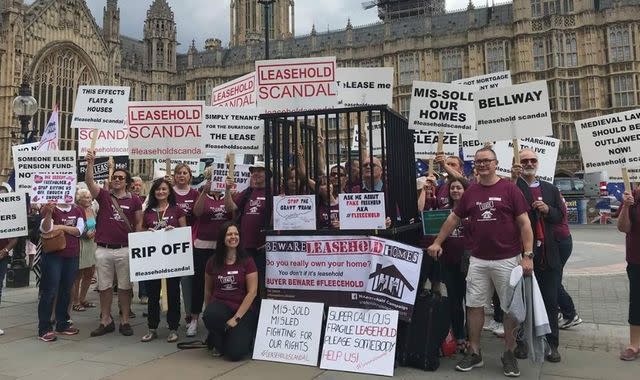Labour drops pledge to abolish leasehold within 100 days - but is still committed to the reforms

Labour has dropped its pledge to abolish leasehold within the first 100 days of government if it wins the general election.
The party is still committed to getting rid of the system, but those working on the policy believe they need more time to enact such a radical measure after the Tories watered down their own promises on reform, Sky News understands.
Politics Live: PM defends record after grim NHS figures
Labour MP Barry Gardiner, who has been campaigning for years to abolish leasehold, defended the move amid backlash from housing campaigners.
Harry Scoffin, founder of Free Leaseholders, told Sky News: "The news that Labour has dropped a pledge to bring forward radical anti-leasehold legislation within the first 100 days is worrying.
"Leaseholders have been mucked about by a succession of governments for decades now.
"With a general election only months away, we need firm assurances that Labour still intends to end leasehold and enact mass commonhold, as they have always promised. 5.3 million households will be looking at their manifesto hoping for better."
But Mr Gardiner said: "Labour is absolutely committed to wholesale Leasehold Reform in its first term.
"The issue is not whether the bill gets its first reading on day 95 or day 105 - it is whether it passes into law. That is what leaseholders need and it is what a Labour government will do."
What is leasehold?
Leasehold is a type of property contract that allows the homeowner to live in a property - usually a flat - for a fixed term.
Under this system, leaseholders often have to pay expensive ground rent and service charges to freeholders, who own buildings or land on which the homes are built.
The costs associated with leasehold have soared in recent years, especially in light of the building safety scandal that emerged after Grenfell, with people across the country facing "life-ruining" bills for repairs.
The rising costs have made it increasingly harder for people to sell their properties, leaving them trapped in homes that are effectively worthless.
Read More:
'Buying a flat ruined my life': Leaseholders plead for tougher legislation against home ownership 'scam'
UK spends more on housing than almost any other developed country, and gets the least value from it too
Last May, the then-shadow housing secretary Lisa Nandy said that a future Labour government would abolish leasehold within 100 days.
It is not clear how quickly Labour now intends to pass anti-leasehold laws but it will be at the earliest opportunity within the next parliament if they win the election, it is understood.
The change in timing comes after Housing Secretary Michel Gove dropped his own pledge to entirely scrap the system, which he has called "outdated and feudal".
His Leasehold and Freehold Reform Bill, introduced in the Commons in November, has been widely criticised by Tory and Labour MPs for being "weak" and "unambitious".
Critics say that despite bold promises from successive Conservative ministers to reform leasehold, the legislation enacts only a small proportion of the 300+ recommendations made in the Law Commission's 2020 reports, which set out proposals for the abolition of leasehold.
One racket that MPs and peers want banned is "forfeiture", under which people can be threatened with the loss of their home over non-payment of just small sums of money.
It's also been reported that the Treasury is attempting to force Mr Gove to abandon plans to reduce leasehold ground rents to a "peppercorn" rate, effectively zero, to encourage landlords to sell the freehold to leaseholders.
Mr Gove's bill does ban the sale of new leasehold houses but not the sale of new leasehold flats, which make up 70% of properties affected.
Shadow housing minister Matthew Pennycook has said Labour will enact the Law Commission's recommendations on enfranchisement, right to manage and commonhold in full.
Speaking in December, he said of Mr Gove's bill: "This unambitious piece of legislation makes it clear that proponents of caution and restraint have won out over those who want to lay claim to a legacy of bold reform in this area.
"Labour will have to finish the job and enact all the Law Commission's recommendations on enfranchisement, right to manage and commonhold in full. We are determined to do so."


